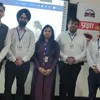AB InBev’s Diane Wauters on working with 12k Indian farmers in 5 years and startups making impact
In an interview with YourStory, Diane Wauters of brewing major Anheuser-Busch InBev (AB InBev) explains how Indian startups will contribute to its sustainability goals.
In her current position as the Sustainability & Agricultural Development Director, APAC for Anheuser-Busch InBev (AB InBev), Diane Wauters has worked with 4,000 Indian farmers in three years. Now, she wants to work with 12,000 more in the next five years.
AB InBev, the world’s largest brewer, has raked in a revenue of $54 billion 2018. With executives like Diane, the company is reimagining India’s many problems—such as water and waste management, which are touted as negatives—as great places to cause impact, by way of new tech in changing the way farmers produce crops and manage the supply chain.
Diane has worked extensively in water management in China and has understood the pricing necessary to make sustainability products scale for startups.
In this interview with YourStory, she explains why she believes Indian tech can solve sustainability goals at scale.
Edited excerpts of the interview:
YourStory: Why did ABInBev redefine its sustainability goals?
Diane Wauters: In March 2018, we launched our most ambitious sustainability goals yet. We had programmes in the past, between 2012 and 2017, and they were focussed on water and saving energy. But that was mostly within our company. In 2018, we decided to take this to the next level.
We launched four sustainability goals to be achieved by 2025: water stewardship, smart agriculture, circular packaging, and climate action. Climate action has two pieces—renewable electricity and a 25 percent reduction in carbon emission.
We decided on 2025 because we cannot solve it by ourselves. We need partners, and we need to work with startups; we created 100+ Accelerator Global, an accelerator, for that purpose. One company cannot solve it.
YS: How are you working with and helping out farmers?
DW: We work on locally sourcing ingredients from farmers in India. For a beer like Budweiser, the barley has to be based on our standards. We skill them on the quality we want and we train them in farming methods and empower them to be entrepreneurs. We work with close to 4,000 farmers and have plans to go to 12,000 in five years.
Digitalisation is important for us if we have to scale, and we work with a startup called KisanHub. This startup uses tech to help farmers with supply chain complexity, provides communication for farmers to manage their crops, and manages how their produce is moved across the chain and resolves risks.
We have our own agronomists who help the farmers; they visit them every month and guide them to grow better produce. The advice I give to startups is that they need to build businesses that can scale, which means when they work with a company like ABInBev they also have to understand how a big company, such as ours, works at scale.

Diane Wauters
YS: Can you tell us about your startup programmes?
DW: We received 600 applications globally last year for our startup programme. We have just closed our applications for this year, after looking at 1,000 applications. In 2018, we selected two startups to go to New York from India and participate in our global accelerator programme.
There was a total of 21 startups from across the globe at the bootcamp in New York. We target entrepreneurs and students with great ideas every year. If we can understand them better then we can become a better company. Apart from KisanHub, we have OpenWater, which is a company that purifies water at the source with their technology. We use their tech in one of our plants.
‘Waste to well-being’ is another big programme for us where we ensure that each of our packaged material is sustainable. Our packaging is unique in that it is designed for reuse. Our accelerator itself is called “100plus Accelerator’’ because we want to be around making an impact even after 100 years.
So, if startups can go on to the AB InBev website and check out our sustainability goals they can choose any goal that they want to solve and we are happy to receive their applications before they are selected. We are also big on renewable electricity and we intend to use 100 percent renewable electricity by 2025 across our factories. Today, one of the factory lines in India for Budweiser runs completely on renewable electricity.
YS: Do you think startups should have a community approach to scale?
DW: Sustainability itself is such a broad term, and startups solving this should also understand how to price their products and focus on one goal. This is why India fascinates me so much because of the opportunities to learn and build solutions for sustainability.
I have been here three years and have worked with several startups with their business plans and their approach to impact through business. Previously, I was in China for six years, in water management. If there has to be impact in the world, it has to be an ecosystem and community, it can never be achieved alone.
The AB InBev management wants to make an impact and therefore, it allows people like me to work towards creating that community. Sustainability has to be part of leadership. The complexity in India for me is the opportunity to drive change.
There are challenges, but look at the impact we can make together. Technology will also make a major impact, especially things like blockchain will bring about transparency in the business ecosystem.
(Edited by Evelyn Ratnakumar)



![[YS Exclusive] 76 startups and counting: why 500 Startups is betting on India](https://images.yourstory.com/cs/2/b3bfb136ab5e11e88691f70342131e20/CourtneyPowell1572791977090jpg?fm=png&auto=format&h=100&w=100&crop=entropy&fit=crop)





